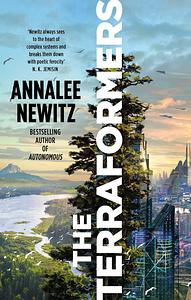You need to sign in or sign up before continuing.
Take a photo of a barcode or cover
adventurous
hopeful
inspiring
reflective
slow-paced
Plot or Character Driven:
Plot
Strong character development:
Complicated
Diverse cast of characters:
Yes
Flaws of characters a main focus:
No
Sweeping, grand, and grounded.
Terraformers has got the heavy sci-fi of, well, terraforming, plus cooperative/council-based governance and models of community living (the acknowledgements mention Cree futurism) tucked right up against corporate-owned resort planets with slaved workers built for and owned as property by those corporate interests/investors, PLUS ethical considerations for living in a universe where "person" is a legal status given to any sapient being with sufficient intelligence (with all the debates over how intelligence is measured) and people (and animals, and machines) can be purpose-built to limit their ability to express intelligence.
By the end of the book a flying train and a cat are in love and it isn't even weird because they're both people, but it is still real fuckin weird that the corporate interests attempting to claim the planet on which they were generated are deliberately building a "virgin Pleistocene-era Earth replica" and consistently refusing to acknowledge the sovereignty of the cooperative government they treated with only under threat of those free people activating the planet's latent plate tectonics system (which would destroy their marketability and property values because no one who could live on a spaceport is going to put up with planetary inconveniences like natural disasters).
The lack of a hard resolution feels very appropriate given that the conflict isn't between people, but between systems, and any one individual's role in a system isn't going to be "heroically swoop in and save the day forever" but to do their small part to push toward progress.
Terraformers has got the heavy sci-fi of, well, terraforming, plus cooperative/council-based governance and models of community living (the acknowledgements mention Cree futurism) tucked right up against corporate-owned resort planets with slaved workers built for and owned as property by those corporate interests/investors, PLUS ethical considerations for living in a universe where "person" is a legal status given to any sapient being with sufficient intelligence (with all the debates over how intelligence is measured) and people (and animals, and machines) can be purpose-built to limit their ability to express intelligence.
By the end of the book a flying train and a cat are in love and it isn't even weird because they're both people, but it is still real fuckin weird that the corporate interests attempting to claim the planet on which they were generated are deliberately building a "virgin Pleistocene-era Earth replica" and consistently refusing to acknowledge the sovereignty of the cooperative government they treated with only under threat of those free people activating the planet's latent plate tectonics system (which would destroy their marketability and property values because no one who could live on a spaceport is going to put up with planetary inconveniences like natural disasters).
The lack of a hard resolution feels very appropriate given that the conflict isn't between people, but between systems, and any one individual's role in a system isn't going to be "heroically swoop in and save the day forever" but to do their small part to push toward progress.
Minor: Slavery
Outstanding world building, and I was surprised how inventive and different this novel was compared to the previous book by this author I had enjoyed, “The Future of Another Timeline.” The first third would have made a great standalone novella, dealing with allegories for climate change, racism, slavery, and capitalism. I’d recommend the first third to friends. The second two-thirds grew tedious with new characters I never grew to like. The audiobook had grating musical effects and bad accents.
adventurous
funny
hopeful
informative
inspiring
mysterious
reflective
tense
medium-paced
Plot or Character Driven:
A mix
Strong character development:
Yes
Loveable characters:
Yes
Diverse cast of characters:
Yes
Flaws of characters a main focus:
Complicated
I liked the concept but the science elements was a tad confusing and a bit slow. Sad considering that I really wanted to like it.
I could not get into this book. It kinda felt like a me problem though. Like the book was too smart for me and because of that I always felt disconnected from the characters and story.
adventurous
challenging
informative
reflective
slow-paced
Plot or Character Driven:
Plot
Strong character development:
No
Loveable characters:
Complicated
Diverse cast of characters:
Yes
Flaws of characters a main focus:
Complicated
This book was chosen for my local sci-fi/fantasy book club—not one I would’ve picked myself. It’s grown on me after reflection (and probably will more after our discussion).
I was the only non-white person in the room, and this book forces social justice themes. That meant I ended up doing a lot of explaining to the group—but weirdly, it was in those moments of explaining that I started liking the book more. The anti-colonialism, gentrification, and "who gets to be human?" themes hit hard. Structurally, it’s three novellas mashed into one (different eras, abrupt shifts). I wasn’t ready for that, and it killed my momentum. Did the audiobook version help? Sorta. The production was dynamic, but the unconventional names (like "Sulfer") and word-as-name choices had me rewinding constantly.Final take? It’s a good book, but one I’d only push toward a very specific reader. Still, glad my book club chose it—I’d never have touched it otherwise.
Notable quote:
I was the only non-white person in the room, and this book forces social justice themes. That meant I ended up doing a lot of explaining to the group—but weirdly, it was in those moments of explaining that I started liking the book more. The anti-colonialism, gentrification, and "who gets to be human?" themes hit hard. Structurally, it’s three novellas mashed into one (different eras, abrupt shifts). I wasn’t ready for that, and it killed my momentum. Did the audiobook version help? Sorta. The production was dynamic, but the unconventional names (like "Sulfer") and word-as-name choices had me rewinding constantly.Final take? It’s a good book, but one I’d only push toward a very specific reader. Still, glad my book club chose it—I’d never have touched it otherwise.
Notable quote:
A government’s job is to recognize people, to help them make their own agreements with each other— and if you do your job well, those people become your political allies.
Really interesting world building and characters. I think however I would have liked to spend more time with Destry and Whistle as that was the section of the book I enjoyed the most.
adventurous
challenging
emotional
funny
hopeful
informative
inspiring
reflective
medium-paced
Plot or Character Driven:
Plot
Strong character development:
No
Loveable characters:
Yes
Diverse cast of characters:
Yes
Flaws of characters a main focus:
No
Wow wow wow wow wow.
On the surface this is a book about a culture of environmentalist Terraformers on a private planet called Sask-E. The terraformers were built by the corporation and are corporation property, aka slaves, and they range from an intelligent moose with wings to a pair of drones that share a consciousness to a homo sapien with soil sensors built into her fingers, and that’s just the tip of the iceberg.
Underneath, this book is a layered commentary on colonialism, environmentalism, and politics. While I was reading at times I thought I was reading about Palestine. At other times I thought I was reading about Indigenous Americans. At other times I thought I was reading a treatise about slavery and how humans will always find a way to institute caste systems. And at times I thought I was reading about how the way we take care of each other and the world around us IS politics and environmentalism, how it’s not always mass protests and lobbying and war, but the small actions of each community to find solutions to problems that serve the community long term. This book wasn’t one of those things, it was all of them.
This book is told in 3 time periods over the course of a thousand years, so the cast of characters changes throughout the book. That was jarring a bit, but there was continuity in the family lines and the villains of the story. I kind of hated reading about how my favorite characters died “off screen” but the rich colonizers were still alive. I know I was meant to hate that, that it was an intentional choice meant to convey meaning, I only wish that the couple of robot characters that were alive the entire time were more central to the plot so that the timeline jumps weren’t as gut wrenching. However, I can’t say that if I had edited the book I would have made a different choice.
This is a book that I will keep on my shelf and go back to. One I hope to group read with my kids or friends. And I will absolutely be picking up the next Annalee Newitz book!
On the surface this is a book about a culture of environmentalist Terraformers on a private planet called Sask-E. The terraformers were built by the corporation and are corporation property, aka slaves, and they range from an intelligent moose with wings to a pair of drones that share a consciousness to a homo sapien with soil sensors built into her fingers, and that’s just the tip of the iceberg.
Underneath, this book is a layered commentary on colonialism, environmentalism, and politics. While I was reading at times I thought I was reading about Palestine. At other times I thought I was reading about Indigenous Americans. At other times I thought I was reading a treatise about slavery and how humans will always find a way to institute caste systems. And at times I thought I was reading about how the way we take care of each other and the world around us IS politics and environmentalism, how it’s not always mass protests and lobbying and war, but the small actions of each community to find solutions to problems that serve the community long term. This book wasn’t one of those things, it was all of them.
This book is told in 3 time periods over the course of a thousand years, so the cast of characters changes throughout the book. That was jarring a bit, but there was continuity in the family lines and the villains of the story. I kind of hated reading about how my favorite characters died “off screen” but the rich colonizers were still alive. I know I was meant to hate that, that it was an intentional choice meant to convey meaning, I only wish that the couple of robot characters that were alive the entire time were more central to the plot so that the timeline jumps weren’t as gut wrenching. However, I can’t say that if I had edited the book I would have made a different choice.
This is a book that I will keep on my shelf and go back to. One I hope to group read with my kids or friends. And I will absolutely be picking up the next Annalee Newitz book!
Graphic: Genocide, Gore, Racism, Transphobia, Grief, Colonisation, Classism
Moderate: Slavery, War
Minor: Ableism, Animal cruelty, Chronic illness, Sexual content, Police brutality
medium-paced
Plot or Character Driven:
Plot
Strong character development:
No
Loveable characters:
No
Diverse cast of characters:
Yes
Flaws of characters a main focus:
No
Book reads like conservative satire of a liberal future, which is sad because I think the author is entirely earnest. Giving things like robots and animals personhood would be far more interesting if they weren't just humans in other bodies. I can't think of a good way to include a train/cat romance subplot either... By the end I was reading it for laughs.





